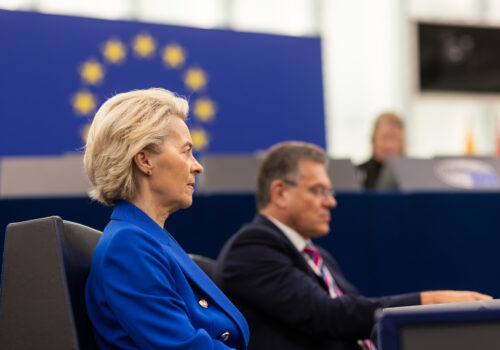European Union (EU) leaders are traveling to Beijing for a summit on Thursday marking fifty years of EU-China diplomatic ties. But the mood ahead of the golden anniversary is more steely than celebratory. The two sides are at odds on a range of issues from trade to human rights, and expectations are low for a breakthrough. Even scheduling the event was a challenge, as it was planned for Brussels, until Chinese President Xi Jinping declined the invitation. It was then moved to Beijing and shortened from two days to one. All of this has happened as the Trump administration continues its aggressive trade approach toward both powers. Below, Atlantic Council experts answer the most important questions on what each side really wants from the summit, which both seem to be attending with caution.
1. What is the state of the EU-China relationship?
The upcoming EU-China Summit marks fifty years of diplomatic ties, but celebrations will be muted amid deepening tensions. While Beijing signals interest in closer ties with Europe, it shows little willingness to change course on key economic, technological, and security issues. China is the largest trading partner for imports and the third-largest for exports from the EU, with more than $980 billion in trade in goods and services in 2024 and a significant, ever-increasing trade deficit for the EU. Since 2019, the European Commission has adopted a more assertive stance, labeling China a “systemic rival,” “economic competitor,” and “negotiating partner.” Frustrated by China’s lack of reciprocity and unfair trade practices, the EU skipped its usual High Level Economic and Trade Dialogue in June. A second day of the upcoming summit was also canceled, reflecting growing strains and unresolved disputes. The summit may yield some modest progress on promises of economic cooperation but will be very unlikely to deliver any major new agreements.
—Valbona Zeneli is a nonresident senior fellow with the Atlantic Council’s Europe Center and the Scowcroft Center for Strategy and Security.
***
When the EU and China meet in Beijing this week, another silent party will be at the table: the United States. The EU has been trying to chart its own separate strategic bilateral relationship with China for at least two decades. The result has been less than productive from a geopolitical perspective.
The crucial weeks before the summit have laid bare the challenges. Europe’s trade deficit with China rivals that of the United States for multiple reasons, but the road mostly leads to the auto sector. On the export side, the European supply chain supports thousands of smaller companies across the EU whose components end up inside vehicles exported predominantly from Germany. On the import side, the EU’s quick shift to renewable energy has left the continent at least as dependent on Chinese wind and solar components as it was on Russian fossil fuels. The dramatic increase in reliance on US liquefied natural gas is positioned as a temporary transition until such time as Europe can become fully reliant on green energy.
All indications point toward the EU and China facing down US President Donald Trump’s tariff war separately rather than joining together. European frustration with Chinese overcapacity, Chinese support for Russia in Moscow’s war on Ukraine, and Beijing’s growing ties with EU members Hungary and Greece helped fuel a tariff war this year that gets far less press than the US tariff war. From electric bicycles, medical equipment, and electric vehicles (EVs), Brussels has been turning to the Trump playbook to try to get Beijing’s attention. So far, it has not worked.
Beyond economics, the two sides’ geopolitical bargaining strategies also operate against a productive summit this week. China is not likely to welcome an interlocutor or partner; it seeks to send a message of independent strength to the world despite its precarious economic condition and its shrinking access to affluent advanced economies. Ironically, the EU seeks the same objective. Both China and the EU want to position themselves as homes to the next-best reserve currency and as the rational alternative to the United States. Banding together would make each side look weak. The most that can be hoped for at this stage are placid photo opportunities that manage to smooth over the rough edges and ensure that these strategic rivals continue to engage seriously (if not productively) at the senior level.
The more important EU summit to watch this week may be with China’s regional rival Japan. The bilateral relationship accounts for nearly 25 percent of global gross domestic product and 20 percent of global trade, according to the European Council. These two Group of Seven (G7) partners share mutually reinforcing commitments to establishing leadership positions in the energy transition, sustainable development, advanced manufacturing, technology, and the exercise of authority through multilateral institutions. Counterbalancing Chinese influence in both Asia and Europe while standing firm in support of Ukraine is never far from the agenda among these two strategic partners. Real, economically significant deals and decisions are far more likely to flow from the Tokyo summit this coming week than from Beijing.
—Barbara C. Matthews is a nonresident senior fellow with the Atlantic Council. She is also CEO and founder of BCMstrategy, Inc and a former US Treasury attaché to the European Union.
2. What does the EU hope to get out of this summit?
The EU remains concerned about its chronic trade deficits, limited market access due to nontariff barriers and opaque rules, industrial overcapacity, rare-earth restrictions, forced tech transfer, and currency manipulation. On the security side, the EU is concerned about the “no limits” partnership between China and Russia, as well as Beijing’s support for Russia’s aggression against Ukraine. At the summit, the EU will aim to secure concrete concessions from China on ensuring reliable access to rare earths and critical minerals through unrestricted export licenses. Brussels will also try to promote a more level playing field in trade by demanding greater market access reciprocity for EU companies and fairer treatment under China’s regulatory framework.
—Valbona Zeneli
3. What does China hope to achieve?
Beijing desperately needs Europe to keep its markets open to China’s EVs and other goods that it produces at overcapacity. With the United States and other major markets closing their doors, Europe is the main dumping ground for higher-value-added goods, particularly EVs. Chinese leaders will be seeking assurances that Europe will not side with the United States against China or adopt what Beijing views as overly stringent protection policies (such as EV tariffs that accurately reflect Beijing’s market-distorting subsidies). China will also seek to tamp down rising European panic over its rare-earth export controls. Beijing is trying to thread the needle between assurance and coercion on rare earths. Chinese officials are claiming that recent European shortages are the result of normal bureaucratic adjustments as China rolled out its new export-control regime and that there is thus nothing to worry about going forward. Meanwhile, Chinese leaders are also hinting that these export controls could become much more severe in the future if Europe adopts policies that Beijing objects to.
By now, Beijing likely realizes that it will not achieve the win-win lovefest that Chinese leaders originally hoped for. (They tried to restart the EU-China Comprehensive Agreement on Investment, but the Europeans made it very clear they wanted to talk about the worsening trade balance instead.) As a result, Beijing has likely downgraded its expectations for the summit and may be instead doubling down on bilateral engagements aimed at dividing the bloc to prevent Brussels from moving forward on more serious trade measures such as EV tariffs.
—Melanie Hart is the senior director of the Atlantic Council’s Global China Hub and a former senior advisor for China at the US Department of State.
***
Beijing has previously endorsed the concept of EU strategic autonomy, in part to drive a wedge between the EU and the United States and weaken transatlantic economic and security relations. It seeks to position the EU as a partner while casting the United States as unreliable. Beijing is working to rebrand itself in Europe as a responsible global actor committed to multilateralism and climate cooperation, while downplaying and diluting criticism over its alignment with Russia, aggressive posture toward Taiwan, and ongoing human rights abuses.
On the economic front, Beijing’s goal is to persuade European leaders to revive the previously abandoned Comprehensive Agreement on Investments, to rescind EU sanctions and tariffs targeting Chinese EVs and solar products, and to delay other measures against industrial overcapacity and state subsidies. In a symbolic gesture to improve relations, the Chinese government has lifted sanctions on some members of the European Parliament. Beijing is seeking to buy time and leverage dialogue as a means to soften the EU’s trade defenses and prevent further deterioration in its economic relations with the bloc.
—Valbona Zeneli
4. Where are there divergences between the European Commission and the EU member states’ approach to China?
The COVID-19 pandemic and Russia’s war in Ukraine have sharpened European awareness of the strategic challenge posed by China, but the EU’s approach to China remains uneven. Disagreements stem from ongoing internal debates, within and between EU member states and institutions, on the right strategic posture, economic policies, and diplomatic messaging toward Beijing.
National policies differ based on the depth of bilateral ties with China, levels of economic and technological dependence, leadership views, public opinion, and tensions between the public and private sectors. While countries such as Lithuania and the Czech Republic have adopted a more critical stance on China, others such as Hungary, Spain, and Greece favor a more conciliatory approach, aiming to maintain solid economic relations. In recent years, the European Commission has pursued a values-driven foreign policy, pushing for sanctions in response to human rights violations in Xinjiang and Hong Kong, while some member states have resisted or diluted these efforts, often influenced by bilateral pressure from Beijing. These divergent priorities reflect Europe’s complex political and economic landscape and continue to shape its China policy as well as its positioning in the broader US-China rivalry.
—Valbona Zeneli
5. How is the EU-China relationship evolving in light of tense relations with the United States?
The summit is an opportunity for Europe to affirm its own geopolitical position vis à vis China, at a moment when US policy seems increasingly unpredictable, with its search for short-term, transactional deals. This is even more important as EU leaders, in a fierce economic competition with China, cannot arrive in Beijing on Thursday in a united front with the United States given the pending EU-US trade talks and debates around the US strategic posture shifting away from Europe. These US-EU divisions likely played a role in Chinese officials’ approach to preparatory pre-summit talks, during which Chinese Foreign Minister Wang Yi publicly affirmed for the first time Beijing’s long-standing policy that it can’t accept Russia losing its war against Ukraine. This statement is an evolution from Beijing’s previous facade of neutrality in the war, which may mean that China sees itself in a sufficiently strong position to clarify its stance, even stating in public at a high level that it wants to directly challenge the US strategy of prioritization at the expense of European security.
—Léonie Allard is a visiting fellow at the Atlantic Council’s Europe Center, previously serving at the French Ministry of Armed Forces.
***
The EU is taking a pragmatic and cautionary approach to avoid being pulled into the great-power rivalry between Washington and Beijing, aiming at protecting its economic interests while acknowledging the systemic challenges posed by China’s global ambitions. EU officials are increasingly alarmed about the negative impact of potential US tariffs on European exports in the absence of a trade deal. There are growing fears that EU industries could be caught in the crossfire of the United States’ broader economic confrontation with China. EU officials are also worried that aggressive US tariff policies could undermine transatlantic economic cooperation and disrupt supply chains critical to Europe’s economic resilience. Additionally, policymakers in Brussels are increasingly concerned that the spillover effects of US–China trade tensions and the impact of Chinese industrial overcapacity on the global market could further threaten key European industries.
China would be the primary beneficiary of a transatlantic rift and the weakening of the liberal international order at a time of growing geopolitical and economic uncertainty. A successful US–EU trade agreement would be beneficial for the transatlantic economy and help address a wide range of other challenges by presenting a united front against adversaries’ economic and geopolitical pressures. The United States and the EU enjoy strong security links through NATO. And the transatlantic economic partnership, worth $9.5 trillion in annual trade and investment, is the largest in the world, meaning the United States and the EU remain each other’s most important trading markets and geoeconomic bases.
—Valbona Zeneli
Further reading
Mon, Jul 21, 2025
Why European businesses are now stuck in the middle of an EU-China storm
Econographics By Alisha Chhangani
If relations continue to deteriorate, the world’s three major economies could find themselves in economic conflict and European businesses will be caught squarely in the middle.
Thu, Jun 26, 2025
To retaliate, or not to retaliate, that is the question for the EU on Trump’s tariffs
New Atlanticist By Frances Burwell
Striking back at US tariffs is unlikely to help the EU achieve its goals of a more stable and open trading partnership with the United States.
Mon, Jul 14, 2025
Injecting new life into Europe’s life science industry to improve competitiveness
Econographics By Emma Nix
US turmoil under Trump has shaken the life sciences sector, prompting top researchers to consider leaving. Europe now has a rare chance to attract this talent and revive its biotech and pharma industries—but only if it moves quickly and decisively before China does.
Image: Chinese Vice Premier Ding Xuexiang and European Commission Executive Vice-President for a Clean, Just and Competitive Transition Teresa Ribera attend a meeting at the Diaoyutai State Guesthouse in Beijing, China July 14, 2025. REUTERS/Florence Lo/Pool



